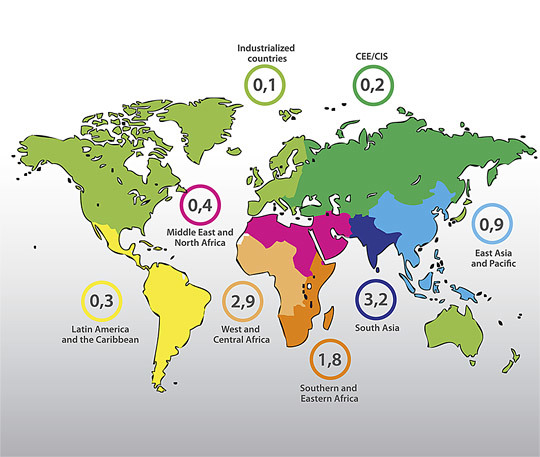Stoltenberg launches Campaign to Reduce Maternal and Child Deaths
Historical archive
Published under: Stoltenberg's 2nd Government
Publisher: Office of the Prime Minister
Press release | No: 116-07 | Date: 26/09/2007
At the Clinton Global Initiative in New York today, Prime Minister Jens Stoltenberg of Norway led the launch of a global campaign to save the lives of millions of women and children. On behalf of Norway, Prime Minister Stoltenberg pledged US $ 1 billion dollars to save lives.
At the Clinton Global Initiative in New York today, Prime Minister Jens Stoltenberg of Norway led the launch of a global campaign to save the lives of millions of women and children. On behalf of Norway, Prime Minister Stoltenberg pledged US $ 1 billion dollars to save lives.
Speaking in New York this morning, Stoltenberg said stronger health systems could mean that the four million newborn babies who currently die in their first month of life, could in fact survive if they were breastfed or were treated with antibiotics by trained medical workers.
“Increased and dependable financing would also make a big difference in saving the half a million mothers who die each year in pregnancy or when giving birth,” said Stoltenberg.
Prime Minister Stoltenberg presented the Campaign’s three main thrusts:
1. Financing survival.
“With less than one billion USD, we have saved more than 2.3 million lives since 2001 by providing vaccination. Now we need to go beyond vaccines. The four million newborn who die in their first month may survive the first days and weeks of their lives if they are breastfed, and have access to antibiotics and health personnel. The half a million women who die in pregnancy or giving birth can be saved with simple means. Extra financing will make a big difference”, Stoltenberg said.
2. Organizing survival.
“To get return on our investment, we need to cut bureaucratic layers. Health personnel should treat more patients and file fewer reports. Money should be an incentive to increase the number of treatments, either by clinics getting paid for the number of women and children they provide care for, or by giving money to women for going to clinics. Thus, treatment becomes a source of income rather than a cost, and the finance system a driver for improved results”, the Prime Minister said.
3. Advocacy for women and children.
“The campaign will raise awareness that millions of women and children can be saved with modest means. When making the case for increased finance, we will also show and tell that we can save more lives”, Stoltenberg said.

Latest figures show that 9.7 million children under-five are dying every year, down from over 12 million in 1990 Most of these children are dying in developing countries from preventable causes for which there are known and cost-effective interventions. Unless efforts are increased there will be little hope of averting the additional 5.4 million child deaths per year needed to achieve MDG4 of a two-third reduction by 2015. The map shows estimated number of deaths (in million) occuring before the age of five in 2006. Source: UNICEF
Performance-based financing
In announcing his health systems initiative, Stoltenberg said results-based financing would be a key incentive to bring about better, sustainable long-term health for mothers and children.
“We’ve seen this work wonders in India with having would-be mothers have their babies in health facilities instead of staying at home and risking losing their babies or their own lives. In this way, treatment becomes a source of income rather than a cost, and the finance system drives vastly better results,” said Stoltenberg.
Progress is being made in health
According to the Norwegian Prime Minister, developing countries are making important progress in achieving better health, but much too slowly to reach their 2015 Millennium Development Goals in health, especially those calling for reducing the numbers of child deaths, improving women’s health, and reducing the occurrence of key diseases such as HIV/AIDS, tuberculosis, and malaria.
Stoltenberg said measles vaccination campaigns in Africa were showing successful results by now saving half a million lives every year. The amount of money given in aid for improving the health of the world’s poor has increased substantially. Polio, which paralysed over 350,000 children in 1988, is on the verge of being eradicated.
Still, the Prime Minister said, “the world is off-track in achieving the health MDGs and so we have to run that much harder and faster to honour these far-reaching commitments. The world expects us to meet this commitment by 2015.”
“I am pleased to announce today that we are building a network of global leaders to oversee and ensure that better health care for women and children will indeed be the priority. The millions of lives saved will strengthen the basis for development and prosperity,” said Stoltenberg.
Stoltenberg was joined in his launch by President Jakaya Kikwete of Tanzania, President Armando Guebuza of Mozambique, President Susilo Bambang Yudhoyono of Indonesia, Prime Minister Jan Peter Balkenende of the Netherlands, President Robert Zoellick of the World Bank Group, WHO General Director Margaret Chan and UNICEF Executive Director Ann Veneman.
------------------------------------------------
More information:
Prime Minister Stoltenberg's commitment to the MDGs
Factsheet:
Report:
The Global Campaign for the Health Millennium Development Goals (PDF)
Illustration esitmated child mortality (high definition)